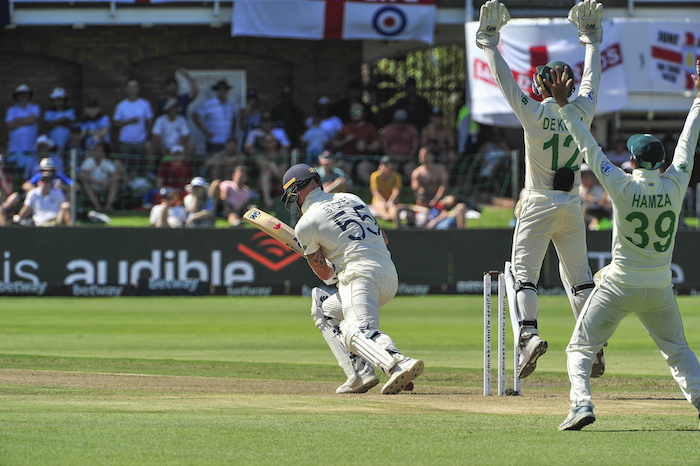When Quinton de Kock called for his helmet and made his way towards the stumps at St George’s Park, the Test match was seven overs old. This was a portent for a day of attrition, writes DANIEL GALLAN in Port Elizabeth.
That South Africa’s wicketkeeper was standing up to the stumps to Vernon Philander does not tell you much in isolation, but when you consider that the embossed golden Kookaburra was still gleaming on the new ball, a particular narrative begins to unfold.
One of a flat, brown pitch baking under a relentless sun. Of a dappled crowd part snoozing, part boozing as the band did the impossible and kept the Barmy Army quiet with an endless stream of jazzed-up pop songs.
The action on the field hung like the suspended drought that has engulfed the Eastern Cape for five years. Relief from the meandering plod and the stifling temperature came in bursts; the latter from gusts of easterly wind, the former from disciplined bowling that stuck to a plan that yielded timely wickets.
Dominic Sibley and Zak Crawley became the first English opening pair to successfully navigate the first session of a Test since Alastair Cook and Andrew Strauss did so against India in 2011. At the lunch interval, the scorecard read 61 without loss.
Opinion: Faf seeking clarity in muddled times
Faf du Plessis’ captaincy has come under fire of late but he emerged for the second session with a strategy already hatched. A lack of assistance through the air or off the seam meant a straight line of attack was required. A surplus of balls aimed at the stumps was asked for and delivered by his seamers.
With the ball a little older and their feet and hands moving more freely, the English openers began to play shots after refuelling at lunch. Their daring proved their downfall as both were caught flicking towards leg gully.
Sibley was the first to go for 36, well held by Dean Elgar off Kagiso Rabada’s bowling. Crawley followed 18 overs later in similar fashion, caught by a diving Rassie van der Dussen off Anrich Nortje for 44.
It is worth noting that both strike bowlers did not open this morning. The new ball was shared between Philander and debutant Dane Paterson. Both were tidy, without being threatening, and questions about the decision were directed to Proteas bowling coach Charl Langeveldt.
‘We get asked questions about why we don’t make the batsmen play enough and so on this surface we wanted to make the new ball count,’ was Langeveldt’s reply. ‘KG is a wonderful bowler with the new ball, but we decided to go with Paterson who bowls a fuller length and makes the batsmen play more.’
The batsmen played, but were not made to play loose strokes. Different questions will be asked like why was Vernon Philander picked if Langeveldt and the rest of the coaching staff knew he would be ineffective with the older ball? Why was he used so sparingly throughout the day? Why did Rabada not take either new ball?
One question that has a reassuring answer at least is the one concerning Du Plessis’ leadership as he refrained from getting carried away by either breakthrough. He could afford to be patient as Keshav Maharaj shrugged off his abject performance in Cape Town and bowled with the control that captains can rest their heads upon.
South Africa’s premier twirler entered the scene in the 21st over and did not leave until the second new ball was taken in the 80th. He bowled 30 overs on the trot, delivered 10 maidens, conceded just 54 runs at 1.8 an over and procured the wicket of Joe Denly for 25. He would close the day with figures of 1-55.
Maharaj’s rhythm exceeded that of the percussionist in the Old Stand to the west. His flight dragged English batters forward and his quick shifts in pace pushed them back in the crease. Full balls were played from the back foot. Balls that would have hit the stumps were played with horizontal bats. Both of these variables played a role in Denly’s dismissal who was trapped lbw.
Joe Root, one of the better players of spin anywhere in the world, seemed to have the measure of Maharaj when he began sweeping in the 64th over. One powerful crunch and one delicate tickle brought the England skipper consecutive boundaries.
Root would not get the chance to press home his advantage as Rabada upended his off-stump seven balls later. A missile sent down at 144km/h hit a good length and kept a little low. Root was beaten for pace and the symphonic sound of leather and cork clattering into wood preceded a thunderous roar from Rabada.
That brought young Ollie Pope to the crease to join Ben Stokes who was beginning his ominous climb through his many gears. Both middle-order batters are as dashing as they come and filled a highlights reel on their own with some of their stroke play. Pope backward of square with flashing blade, Stokes down the ground with a high elbow, Pope over slip with a deft ramp, Stokes through midwicket with disdain.
A fifth-wicket stand of 76 means England will begin again on 224-4 and with their noises just in front. Rain is predicted at various points over the next few days and the best of batting conditions may already be behind us.
South Africa will have to remove both Stokes, who will resume on 25, and Pope on 33 without too many more added. As the crowed began filtering out to enjoy the muggy evening air, ground staff attended to the pitch with broad brooms.
The plumes of dust emanating from their work suggests batting last will be a challenge.
Photo: Deryck Foster/BackpagePix







